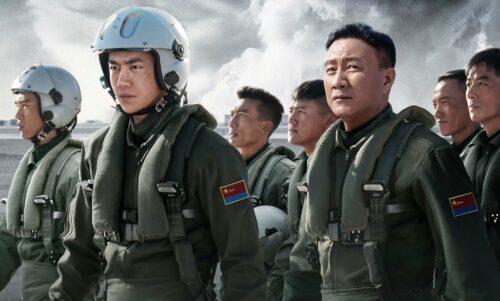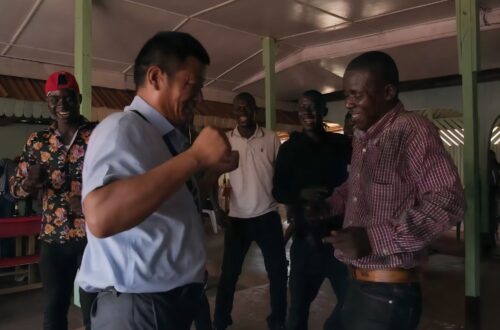Xu Ruotao’s experimental indie films about artists and dissidents
The streaming service Montage has released a collection of seven of director Xu Ruotao’s films, including his most recent documentary, "Ants Dynamics."

Originally an abstract painter, director Xú Ruòtāo 徐若涛 has brought his avant-garde approach off the canvas and onto film. He’s done shorts, documentaries, and two feature films, often with a focus on artists, dissidents, and ruins. His best-known work in the United States is perhaps Yùmén 玉门 (2013), a poignant docufiction about a crumbling oil town in China, co-directed with artist Huáng Xiāng 黄香 and filmmaker J.P. Sniadecki. While Yumen is available elsewhere, the streaming service Montage has released a collection of seven of Xu’s films, including his most recent documentary, Ants Dynamics (蝼蚁动力学 lóuyǐ dònglì xué).
The short Shōu Róng Suǒ 收容所 (2008) is the earliest piece in the collection. It’s a brief tour through a 3D model of a detention center, inspired by artists who spent time in centers during the 1990s. Without any sound or even people present, the animated building’s emptiness invokes the despair and hopelessness of being imprisoned in such a place. Xu’s first feature, Rumination (反刍 fǎnchú) (2009), has a similar sense of desolation with its tiny cast and abandoned landscapes. Its coming-of-age story about a boy during the Cultural Revolution might bring to mind Tián Zhuàngzhuàng’s 田壮壮 The Blue Kite (蓝风筝 Lán Fēngzhēng) or Jiāng Wén’s 姜文 In the Heat of the Sun. Xu’s take on this familiar theme is unconventional, to say the least.
While there are the usual Red Guards running amok, the scenes in Rumination are impressionistic and surreal, including such period oddities as chicken-blood therapy, a pseudoscientific practice of injecting rooster blood into humans to improve their strength. The most striking aspect of Rumination is its sense of time. Title cards sprinkled throughout the narrative inform the viewer of the year, a straightforward passage from 1966 to 1976. This is deceptive, however, since Rumination actually unfolds in reverse-chronological order. While the movie does suffer from some stilted acting in places, Rumination’s ambiguity and non-linear narrative makes it intriguing enough to watch multiple times.
The documentary Building Archeology (建筑考 jiànzhú kǎo) (2011) considers the more recent past. It’s made up of three vignettes about different buildings in Beijing: a museum, an abandoned hospital, and a detention center. The latter two vignettes are especially interesting. In the second, a woman wanders around the ruins of a hospital built in a week to deal with the 2003 SARS outbreak. The third concerns a former prisoner, tracing out a map of the detention center where he was held in 2011. Broken Line (折线 zhéxiàn) (2012), a fictional short, leads up to a meeting between a policeman, two surveyors, a photographer and his assistants, and a few other urbanites disillusioned by modern life.
Expressionism (表现主义 biǎoxiàn zhǔyì) (2017) is a free-spirited documentary dedicated to “those who have difficulty compromising with the world.” Its subject is Huá Yǒng 华涌, an artist and human rights activist with histrionic personality disorder. Xu spent several years following and recording the man, and his footage mixes the mundane with more serious episodes. One moment, Hua Yong might be working and musing on his art, the next he’s arguing with police officers who harass him for “information” or an ID card.
During the final third of the film, Xu arranges an experiment. He pushes another eccentric painter named Qiū Hóngfēng 邱洪峰 to intrude on Hua Yong’s art studio. The men fight, talk, and collaborate before the experiment blows up into a bizarre brawl with the filmmakers. After completing Expressionism, Xu had a hard time getting the movie screened in China. (Its anti-authoritarian tone, and the political activism of its protagonist, might be why you can’t even find a listing on Douban.) In order to reflect on the impact and experience of making Expressionism, Xu next made Bipolar Disorder (双相情感障碍 shuāng xiàng qínggǎn zhàng’ài), an interesting metafilm that brings Qiu back to discuss the documentary with the director.
The final film of the collection, Ants Dynamics, is Xu’s most accessible. It follows performance artist Wáng Chǔyǔ 王楚禹 and his involvement with a group of fired telecommunication workers in the city of Shangluo. These workers were loyal to China Telecom for years, but were fired for no reason and denied pensions. Xu’s documentary records their efforts to file a lawsuit against their former employer, as well as their eyebrow-raising street protests. Although Ants Dynamics lacks the daring experimentation of something like Rumination, its guerilla, politically-charged style makes it an engaging and impactful experience.
The Xu Ruotao collection is available to watch on Montage here. The China Project readers can use the discount code SUPCHINA on all paid content on Montage for the rest of the year. Chinese movie fans might also want to check out the LA Chinese Film Festival’s latest virtual event tonight (10 p.m. EST / Saturday 10 a.m. in China), a conversation with moderator Rebecca Davis and speakers Hao Wu (76 Days), Hao Zhou (Wuhan Factory), and Michael Berry.






